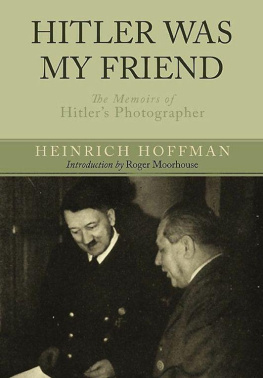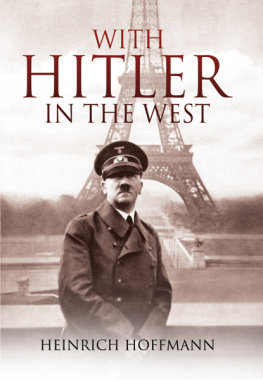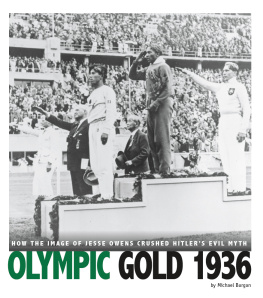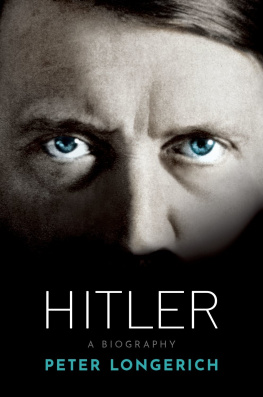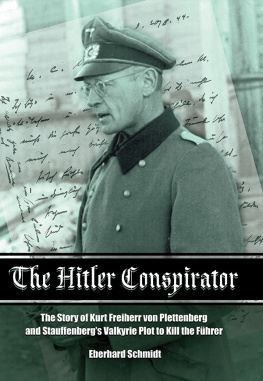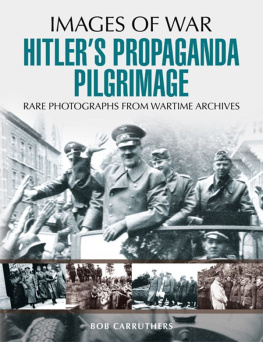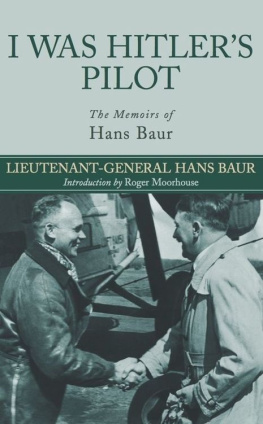Email info@frontline-books.com or write to us at the above address.
The right of Heinrich Hoffman to be identified as the author of this work has been asserted in accordance with the Copyright, Designs and Patents Act of 1988.
Publishing History Hitler was my Friend was first published by Burke Publishing Company Ltd, London, in 1955. This edition has a new introduction by Roger Moorhouse.
All rights reserved. No part of this publication may be reproduced, stored in or introduced into a retrieval system, or transmitted, in any form, or by any means (electronic, mechanical, photocopying, recording or otherwise) without the prior written permission of the publisher. Any person who does any unauthorised act in relation to this publication may be liable to criminal prosecution and civil claims for damages.
Preface
M Y IMMEDIATE REACTION on reading the manuscript of Heinrich Hoffmanns Hitler was my Friend was a feeling of satisfaction that, though it features him so prominently in its title, this was not just another book on Hitler, about whom so much of both fact and nonsense has already been written, but the autobiography of a man, remarkable in both character and experience, already established long before Hitler was ever heard of, as one of the foremost photographers of his age: and one who merits interest in his own right and richly rewards the interest we accord him.
A man who has achieved so outstanding a success in his own profession must, I felt, be both ripe in experience and interesting in his reminiscences; a man who enjoyed Hitlers friendship and complete confidence for twenty-five years, and by so doing incurred the implacable and jealous hatred of the other Nazi leaders and still survived must possess both wit and resource; a man who, on the threshold of old age, suffers such violent reversals of fortune from riches to penury, from security and comfort to the stark rigours of gaol and still faces life with undiminished zest and vigour, must possess both character and courage to a high degree; and finally, a man who, on interrogation, was so swiftly and unconditionally released by our American allies cannot, obviously, be a criminal or, indeed, a bad sort of chap at all.
I was myself not ignorant of the Nazis and their ways. As a staff officer on special intelligence duties I had fenced with them and delved into their activities and secrets; as a prisoner in the hands of the Gestapo I had indulged in a desperate battle of wits, and had acquired a thorough insight into their methods of interrogation; and as an inmate for more than five years of Sachsenhausen and Dachau concentration camps, I had had more than a taste of their treatment of prisoners; and so, when I was invited to go to Munich and discuss the translation with Professor Hoffmann, I accepted with alacrity.
The figure I met was that of a short, comfortably tubby little man. Crowned by a shock of iron-grey hair was a strong and purposeful face, marked with the unmistakable stamp of suffering, which was belied by a pair of bright, merry and quickly twinkling eyes. The hand stretched out in greeting to me was small, tapering and beautifully moulded the hand of an artist. Round the corners of a firm but sensitive mouth the lines drawn by bitter experience struggled in vain for mastery with a smile of irrepressible and bubbling good humour. His speech and gestures were rapid and expressive, and all his movements had the engaging swift pertness of a bird.
The plea of no interest or participation in politics is an apologia that we have recently heard ad nauseam from so many Germans, that we are rightly inclined to treat it with extreme scepticism. But my contact with this genial, happy-go-lucky bon viveur, this essentially bohemian, artistic Heinrich Hoffmann quickly convinced me that in his case, at least, the statement was completely true; and I cannot but feel that the reader, when he reaches the end of this book, will share my conviction.
I spent some weeks in constant daily company with Hoffmann, and in that time an impulsive, spontaneous creature, such as he is, will draw a picture of himself, crystal clear for anyone with eyes to look and ears to listen. He is a typical bohemian, grandiloquent in phrase and gesture, generous, unpractical, perhaps not always strictly accurate, but a born raconteur; in many ways a child, yet withal a shrewd judge of men; and whatever else might be said of him, he would never do a shabby thing, and he is steadfast in his loyalties.
To say of anyone so close to the Nazi throne that he hated injustice is to invite incredulity and derision. But Heinrich Hoffmann did hate injustice, and he hated cruelty. Whenever he came into personal contact with some case of stupid injustice or senseless cruelty he boldly called not upon the Fhrer and Reichskanzler, but on his friend, Adolf Hitler, to rectify it; many a man incarcerated by a ruthless Gestapo was released as a result of his intervention and a mass of grateful letters bears eloquent witness to the fact. You know, Colonel, this book of mine is a bit of a patchwork, Hoffmann assured me in, for him, quite earnest tones, when we came to the end of our labours. A patchwork of reminiscence and impression; of events in which I took part and of people who played leading roles in them and whom I knew intimately. But it does not claim to make any particular contribution to history.
In this I am inclined to think he is being overmodest. The responsible historian, with archives and records at his disposal, strives to give an accurate and factual account of events, to add perhaps to the sum total of our historical knowledge and, with comment justified by his profound research, to submit explanations and perhaps some new light for acceptance or rejection by his readers.
In this sense, admittedly, Hoffmann makes no particular contribution. He confines himself to purely personal aspects, and while the earlier portion of his memoirs, from the peace and security of the opening years of the century through the turmoil of the first war and its aftermath, make lively, interesting and entertaining reading, it is, in the nature of things, on his uniquely intimate association with Hitler, from the earliest beginnings of the Nazi Party to its final annihilation, that our interest is primarily concentrated.
As colour and the deft addition of highlights to a portrait bring life, warmth and reality to what is otherwise merely an academically correct drawing, so Hoffmanns personal descriptions the atmosphere in the Fhrers personal entourage, the vanity and jealousy of Ribbentrop, the keen intelligence and scathing sarcasm of Goebbels, the ruthless brutality of Bormann, the verbal snapshots of leading international statesmen, Hitler, the man his shyness and austerity, his devotion to art, his attitude towards, and his influence over, women all these things add highlights to the bare findings of historical research, and by so doing do, surely, make a contribution, and quite a fascinating contribution, if not to history itself, then at least to our better comprehension of it.

